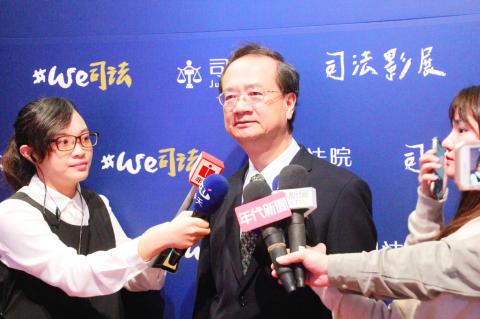Any law that follows from the passage of referendums initiated by groups opposed to same-sex marriage cannot contradict the Council of Grand Justices’ Interpretation No. 748, as it came from the highest ranks of the legal hierarchy, the Judicial Yuan said yesterday.
Interpretations from the grand justices have equal legal weight as the Constitution, Judicial Yuan Secretary-General Lu Tai-lang (呂太郎) told a meeting of the legislature’s Judiciary and Organic Laws and Statutes Committee in Taipei.
Although two referendums were passed that oppose amending the Civil Code to allow for same-sex marriage, the Legislative Yuan cannot pass laws that oppose the interpretation, Lu said.

Photo: Wu Cheng-feng, Taipei Times
The decision delivered on May 24 last year states that provisions in the Civil Code that define marriage as between a man and a woman contravene the Constitution, and required that new regulations be introduced within two years to protect marriage equality.
All three referendums initiated by the Coalition for the Happiness of Our Next Generation were passed on Saturday.
They proposed excluding education about gay people from elementary and junior-high schools, restricting the Civil Code’s definition of marriage to a union between a man and woman, and drafting a separate law to protect same-sex marriage.
Two referendums supporting the inclusion of same-sex marriage in the Civil Code and the teaching of gender-equality education in elementary and junior-high schools were rejected.
Executive Yuan spokeswoman Kolas Yotaka on Sunday said that the government would draft a separate law in three months to extend equal marriage rights to same-sex couples.
Separately yesterday, Judicial Yuan President Hsu Tzong-li (許宗力) on the sidelines of the opening of a film festival in Taipei offered words of encouragement to the nation’s LGBT community.
After the referendum results were announced, the Judicial Yuan heard from some LGBT people who had contemplated suicide because of the results, Hsu said.
“I want to use this opportunity to call on people who supported the failed pro-LGBT referendums to not lose their spirit, to be emotionally strong and to not feel disappointed,” Hsu said.
The rights of the LGBT community have already been protected by the interpretation, which would not be affected by the referendums, he added.
However, the referendum results would have a legally binding effect on the administrative and legislative branches of the government, which might have to protect marriage equality via a separate law, Hsu said.
A separate law would not necessarily afford unequal treatment to the LGBT community, as it would depend on its content, he added.

INVESTIGATION: The case is the latest instance of a DPP figure being implicated in an espionage network accused of allegedly leaking information to Chinese intelligence Democratic Progressive Party (DPP) member Ho Jen-chieh (何仁傑) was detained and held incommunicado yesterday on suspicion of spying for China during his tenure as assistant to then-minister of foreign affairs Joseph Wu (吳釗燮). The Taipei District Prosecutors’ Office said Ho was implicated during its investigation into alleged spying activities by former Presidential Office consultant Wu Shang-yu (吳尚雨). Prosecutors said there is reason to believe Ho breached the National Security Act (國家安全法) by leaking classified Ministry of Foreign Affairs information to Chinese intelligence. Following interrogation, prosecutors petitioned the Taipei District Court to detain Ho, citing concerns over potential collusion or tampering of evidence. The

NEGOTIATIONS: The US response to the countermeasures and plans Taiwan presented has been positive, including boosting procurement and investment, the president said Taiwan is included in the first group for trade negotiations with the US, President William Lai (賴清德) said yesterday, as he seeks to shield Taiwanese exporters from a 32 percent tariff. In Washington, US Trade Representative Jamieson Greer said in an interview on Fox News on Thursday that he would speak to his Taiwanese and Israeli counterparts yesterday about tariffs after holding a long discussion with the Vietnamese earlier. US President Donald Trump on Wednesday postponed punishing levies on multiple trade partners, including Taiwan, for three months after trillions of US dollars were wiped off global markets. He has maintained a 10 percent

TRADE: The premier pledged safeguards on ‘Made in Taiwan’ labeling, anti-dumping measures and stricter export controls to strengthen its position in trade talks Products labeled “made in Taiwan” must be genuinely made in Taiwan, Premier Cho Jung-tai (卓榮泰) said yesterday, vowing to enforce strict safeguards against “origin laundering” and initiate anti-dumping investigations to prevent China dumping its products in Taiwan. Cho made the remarks in a discussion session with representatives from industries in Kaohsiung. In response to the US government’s recent announcement of “reciprocal” tariffs on its trading partners, President William Lai (賴清德) and Cho last week began a series of consultations with industry leaders nationwide to gather feedback and address concerns. Taiwanese and US officials held a videoconference on Friday evening to discuss the

PERSONAL DATA: The implicated KMT members allegedly compiled their petitions by copying names from party lists without the consent of the people concerned Judicial authorities searched six locations yesterday and questioned six people, including one elderly Chinese Nationalist Party (KMT) member and five KMT Youth League associates, about alleged signature forgery and fraud relating to their recall efforts against two Democratic Progressive Party (DPP) legislators. After launching a probe into alleged signature forgery and related fraud in the KMT’s recall effort, prosecutors received a number of complaints, including about one petition that had 1,748 signatures of voters whose family members said they had already passed away, and also voters who said they did not approve the use of their name, Taipei Deputy Chief Prosecutor